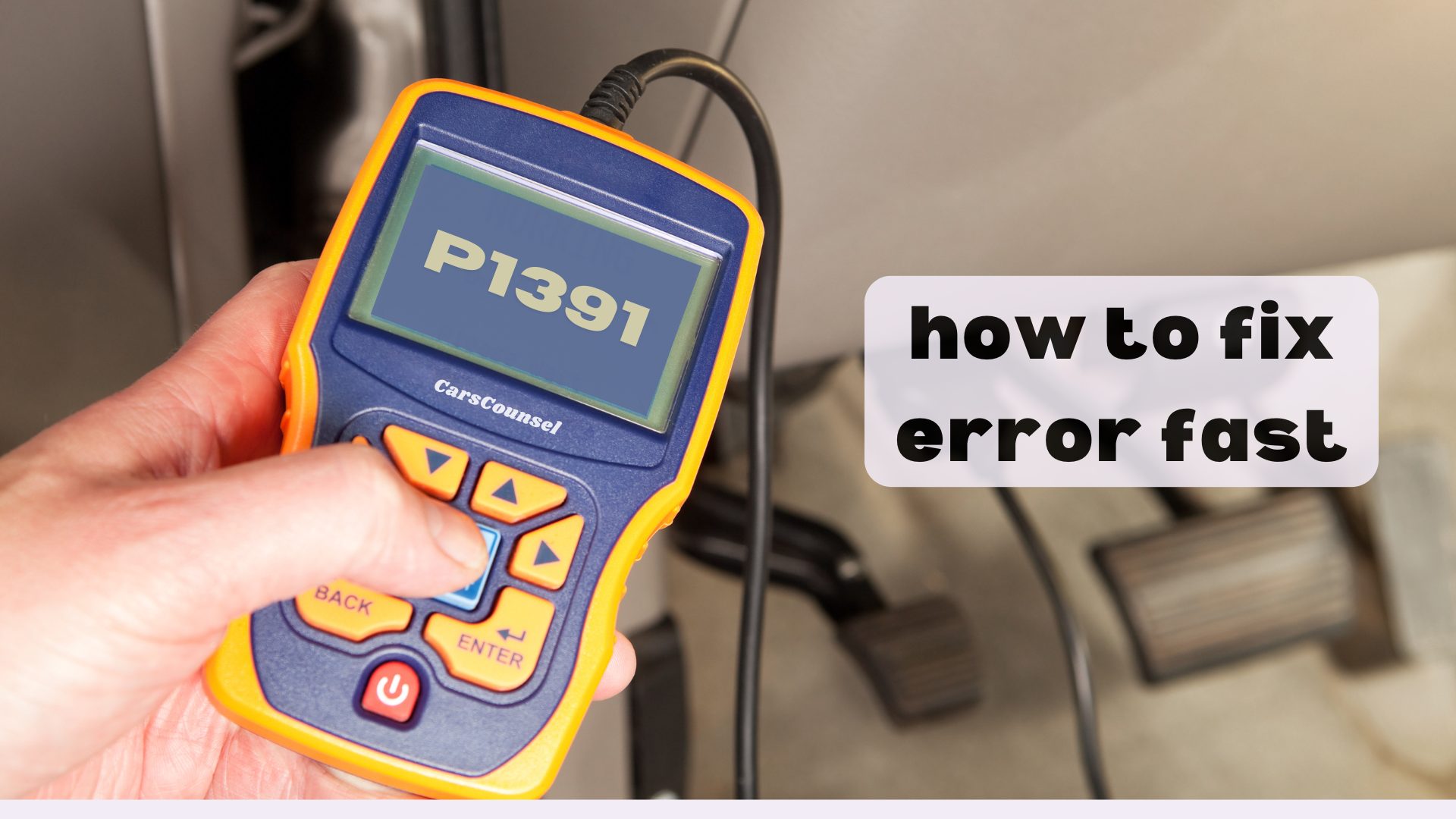You’re probably not thrilled to see that P1391 code on your dashboard, indicating an intermittent issue with your Crankshaft Position (CKP) or Camshaft Position (CMP) sensor signal. This can lead to misfires, poor fuel economy, rough idling, and even stalling – not exactly ideal driving conditions. But don’t worry, you’re taking the first step towards resolving the issue by looking into it further.
Now, it’s time to dig deeper and identify the root cause of the problem. Is it a faulty sensor, wiring issue, or something else entirely? Let’s investigate the possible causes and symptoms to get your engine running smoothly again.

Quick Navigation
Key Takeaways
- The P1391 code indicates an intermittent issue with the Crankshaft Position (CKP) or Camshaft Position (CMP) sensor signal, affecting engine performance and drivability.
- Faulty sensors, wiring, corrosion, or misalignment can cause an intermittent signal, leading to misfires, poor fuel economy, rough idling, and stalling.
- Diagnosing the issue requires a systematic approach, diagnostic tools, and a visual inspection of sensors, wiring, and connectors to identify the root cause.
- Repairing the CMP or CKP sensor involves replacing or cleaning the faulty sensor, inspecting and repairing wiring, and properly aligning and mounting the sensor.
- Accurate diagnosis and prompt repair are essential to maintaining ideal engine performance, preventing further damage, and ensuring reliable vehicle operation.
Understanding Code P1391
When your vehicle’s onboard computer, the Engine Control Module (ECM), detects an intermittent issue with the Crankshaft Position (CKP) or Camshaft Position (CMP) sensor signal, it triggers the P1391 code.
This error code indicates a problem with the signal from either sensor, which provide critical data for engine ignition and fuel injection timing. An intermittent signal can lead to misfires, poor fuel economy, rough idling, and stalling, significantly impacting vehicle performance and drivability.
As a responsible vehicle owner, it’s essential to address this issue promptly to maintain ideal engine performance and prevent further damage. Regular vehicle maintenance, including monitoring engine performance, can help identify potential issues before they become major problems.
Causes of Intermittent Signal
During the operation of your vehicle, a faulty CMP or CKP sensor can cause an intermittent signal, leading to the P1391 code.
This faulty signal can be caused by various issues, including:
- Faulty wiring, which can lead to signal degradation or loss
- Corrosion issues, which can cause the sensor to malfunction
- Sensor misalignment or incorrect mounting, resulting in an inconsistent signal
It’s essential to identify and address these issues to prevent further damage to your vehicle’s engine and performance.
Symptoms of a Faulty Sensor
Faulty CMP or CKP sensors can exhibit a range of symptoms that impact your vehicle’s performance and drivability. You may notice engine misfires, rough idling, or stalling, which can be frustrating and affect your daily commute. Sensor failure can also lead to ignition problems, causing difficulty starting the engine or decreased fuel efficiency.
| Symptom | Description | Impact on Vehicle |
|---|---|---|
| Engine Misfires | Irregular combustion in engine cylinders | Reduced power and performance |
| Rough Idling | Unstable engine operation at idle speed | Decreased fuel efficiency and drivability |
| Stalling | Engine shutting off while driving | Safety risks and inconvenience |
These symptoms can be indicative of a faulty CMP or CKP sensor, and it’s essential to address the issue promptly to prevent further damage to your vehicle’s engine and performance.
Diagnosing the P1391 Issue
Diagnosing the P1391 issue requires a systematic approach to identify the root cause of the problem.
You’ll need to utilize diagnostic tools and follow established scan procedures to pinpoint the faulty component.
- Use a scan tool to retrieve trouble codes and monitor live data to identify patterns or anomalies in the CMP and CKP sensor signals.
- Perform a visual inspection of the sensors, wiring, and connectors to look for signs of damage or corrosion.
- Utilize a multimeter to test the sensors’ voltage and resistance values, ensuring they align with factory specifications.
Repairing the CMP or CKP Sensor
When a faulty CMP or CKP sensor is identified as the root cause of the P1391 issue, you’ll need to replace it with a new one that meets the vehicle’s specifications. Before replacement, perform a thorough sensor cleaning to remove any debris or corrosion that may be affecting the sensor’s performance. Additionally, conduct a wiring inspection to verify there are no damaged or corroded wires or connectors that could be contributing to the intermittent signal.
| Step | Action | Purpose |
|---|---|---|
| 1 | Inspect sensor and wiring | Identify signs of damage, corrosion, or wear |
| 2 | Clean sensor and wiring | Remove debris, dirt, and corrosion |
| 3 | Test sensor voltage and resistance | Verify proper sensor function |
| 4 | Replace sensor if necessary | Install new sensor meeting vehicle specifications |
| 5 | Recheck ECM for stored fault codes | Confirm issue is resolved and no other codes are present
Sensor Alignment and Mounting
One crucial aspect of guaranteeing the CMP or CKP sensor functions correctly is proper sensor alignment and mounting.
You need to guarantee that the sensor is placed in the correct position and mounted securely to the engine block or cylinder head.
Improper sensor alignment and mounting can lead to incorrect signal readings, which can trigger the P1391 code.
Sensor alignment and mounting considerations:
- Sensor Placement: Guarantee the sensor is placed in a location that provides a clear view of the crankshaft or camshaft, allowing it to accurately detect the engine’s rotational speed and position.
- Mounting Techniques: Use the recommended mounting technique, such as a clip or bolt, to secure the sensor to the engine block or cylinder head.
Make sure the sensor is tightened to the specified torque to prevent vibration or movement.
* Sensor Orientation: Verify that the sensor is oriented correctly, with the sensor face parallel to the crankshaft or camshaft, to guarantee accurate signal readings.
ECM Software and Hardware Issues
The Engine Control Module (ECM) is the brain of your vehicle’s engine management system, responsible for processing data from various sensors, including the CMP and CKP sensors, to control engine ignition and fuel injection timing.
If the ECM encounters software or hardware issues, it can lead to ECM glitches, causing the P1391 code to trigger. Firmware errors can also occur, affecting the ECM’s ability to process sensor data accurately.
These issues can result in intermittent CMP or CKP signal problems, leading to misfires, poor fuel economy, and rough idling. You’ll need to scan the ECM for stored fault codes and address related issues to resolve the problem.
It’s essential to diagnose and repair ECM software and hardware issues promptly to prevent further damage to your vehicle’s engine.
Engine Timing Belt or Chain Problems
As your engine’s timing belt or chain wears out, it can cause the crankshaft and camshaft to fall out of sync, leading to intermittent CMP or CKP signal problems that trigger the P1391 code.
This wear can lead to chain wear, causing the belt or chain to skip teeth or jump time, resulting in incorrect engine timing.
- Check the belt tension to confirm it’s within the manufacturer’s specifications, as loose or over-tightened belts can cause premature wear.
- Inspect the belt or chain for cracks, frays, or excessive wear, which can lead to breakage and engine damage.
- Verify the timing belt or chain alignment to guarantee it’s properly installed and not misaligned, which can cause uneven wear and CMP or CKP signal issues.
Average Repair Costs and Estimates
Your repair estimate for the P1391 code will depend on the underlying cause, which can range from a faulty CMP or CKP sensor to more complex engine timing belt or chain problems.
| Repair Component | Estimated Cost |
|---|---|
| Faulty CMP or CKP sensor | $50-$100 |
| Wiring or connector repair | $100-$200 |
| Engine timing belt or chain replacement | $200-$500 |
| ECM software or hardware repair | $100-$300 |
Keep in mind that diagnostic costs, labor rates, and parts prices vary depending on your vehicle’s make and model, as well as the mechanic’s expertise. Be sure to consult with a professional mechanic to get an accurate repair estimate. Don’t forget to inquire about pricing beforehand to avoid any surprises.
Professional Diagnosis and Repair
When dealing with the intricacies of P1391 code diagnosis and repair, it’s essential to seek the expertise of a professional mechanic who can efficiently identify and address the underlying issue.
As a vehicle owner, you’ll want a mechanic who’s familiar with the complexities of CMP and CKP sensors, as well as the latest shop equipment.
The mechanic’s role involves performing a thorough visual inspection, testing sensors, and verifying sensor alignment and mounting.
They’ll utilize advanced shop equipment, such as multimeters and scan tools, to diagnose the issue quickly and accurately.
More OBD-II Codes
Frequently Asked Questions
Can I Drive My Vehicle With a P1391 Code?
You shouldn’t drive your vehicle with a P1391 code, as it affects engine performance, leading to misfires, poor fuel economy, and stalling, compromising vehicle reliability, and it’s recommended to address the issue promptly to avoid further damage and guarantee safe driving.
Will a Faulty CMP or CKP Sensor Cause Engine Damage?
You’re likely aware that 75% of engine failures are caused by faulty sensors. A faulty CMP or CKP sensor can indeed cause engine damage, as sensor failure modes can lead to misfires, which in turn can create excessive crankshaft vibrations, ultimately damaging your engine.
Can I Reset the P1391 Code Without Repairing the Issue?
You shouldn’t clear the P1391 code without repairing the underlying issue, as it’ll only mask the intermittent diagnosis, allowing the problem to persist and potentially cause further engine damage or misfires, making it essential to identify and fix the root cause.
Is It Possible to Fix the P1391 Code Myself?
Can you really be a DIY mastermind? Yes, you can try fixing the issue yourself, but be prepared to invest time and effort, using diagnostic tools to identify the problem, and potentially replacing spark plugs or sensors, requiring technical expertise and patience.
Will a Tune-Up or Oil Change Fix the P1391 Code?
You won’t fix the P1391 code with a tune-up or oil change, as these services don’t address faulty CMP or CKP sensors, wiring issues, or misaligned sensors that affect spark plug and fuel injector timing, leading to misfires and poor performance.
Conclusion
You’ve finally reached the end of this diagnostic journey. Remember, addressing the P1391 code promptly is vital to maintaining your engine’s performance and preventing further damage. Notably, did you know that a faulty CKP or CMP sensor is responsible for up to 20% of all engine misfires? By being proactive and staying on top of regular vehicle maintenance, you can avoid costly repairs down the road.


Really helpful information.
Thanks
These codes are really helpful.
Thank you
You are a life saver man. My car is running better than ever coz of this info.
My pleasure
Well, this was a good one.
Thanks for the appreciation.
useful information.
Thanks
Thanks for the lovely article.
Always happy to help
Nicely written piece.
Thanks for your appreciation.
Most useful car info.
Thanks a bunch